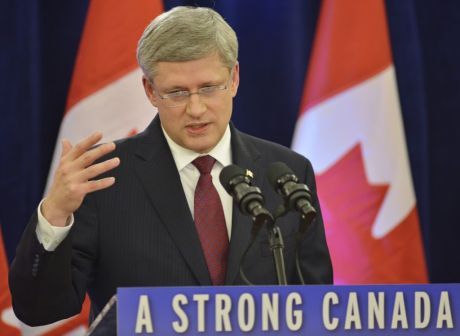Columns
You are here
Resisting colonialism and imperialism

October 30, 2013
The past year has seen people radicalize against colonialism and imperialism, alongside opposition to austerity. Idle No More has led the fight against Harper, and exposed the long history of Canadian colonialism; memories of Iraq, and opposition to more war in the context of austerity, has so far prevented war on Syria. The more we see the connections between economic competition and state violence, the better we can understand and challenge the twin processes of capitalism.
Colonialism and the myth of the “free market”
Despite the myth of “free market” capitalism, it only emerged through Europe’s pillaging of the rest of the world. As Marx described in Volume 1 of Capital, written in 1867—the year the capitalist state of Canada was founded on indigenous land:
“The discovery of gold and silver in America, the extirpation, enslavement and entombment in mines of the aboriginal population, the beginning of the conquest and looting of the East Indies, the turning of Africa into a warren for the commercial hunting of black-skins, signalised the rosy dawn of the era of capitalist production…The colonies secured a market for the budding manufactures, and, through the monopoly of the market, an increased accumulation. The treasures captured outside Europe by undisguised looting, enslavement, and murder, floated back to the mother-country and were there turned into capital.”
Imperialism and World War
As capitalism ages there is a tendency for units of capital to become concentrated and centralized. As this happens the capitalist state comes to play more of a role in defending the accumulation of capital by the most powerful units of capital or corporate and financial interests in each country. This eventually led to world war, but most of the left initially supported it.
The Russian revolutionary Vladimir Lenin wrote Imperialism: the Highest Stage of Capitalism in 1916 to explain the origins of WWI and why people like German Marxist Karl Kautsky had been wrong. As Lenin wrote, “The essence of the matter is that Kautsky detaches the politics of imperialism from its economics, speaks of annexations as being a policy ‘preferred’ by finance capital, and opposes to it another bourgeois policy which, he alleges, is possible on this very same basis of finance capital. It follows, then, that monopolies in the economy are compatible with non-monopolistic, non-violent, non-annexationist methods in politics.”
Instead, Lenin showed how the expansionist nature of the system was related to the drive to accumulate, inherent in capitalism. Just as individual capitals within a nation are in constant competition with each other, so whole nations compete with other nations to divvy up the spoils of capitalist exploitation:
“Capitalism has grown into a world system of colonial oppression and of the financial strangulation of the overwhelming majority of the population of the world by a handful of ‘advanced’ countries. And this ‘booty’ is shared between two or three powerful world plunderers armed to the teeth (America, Great Britain, Japan), who are drawing the whole world into their war over the division of their booty…The epoch of the latest stage of capitalism shows us that certain relations between capitalist associations grow up, based on the economic division of the world; while parallel to and in connection with it, certain relations grow up between political alliances, between states, on the basis of the territorial division of the world, of the struggle for colonies, of the ‘struggle for spheres of influence.’”
Seeing imperialism as a flawed policy led to reformist conclusions that resulted in people supporting their own states in the slaughter of WWI. Seeing imperialism as an inevitable result of capitalism led to revolutionary conclusions that ended the war.
Imperialism and resistance today
These debates continue today. Left thinkers such as Michael Hardt and Antonio Negri have argued that competition between states is now obsolete, and that national antagonisms have been dissolved in a transnational network of capitalism. However, since 2003 and the wars in Iraq and Afghanistan this is a difficult argument to swallow.
In fact, these wars serve to highlight the fault lines of imperialism and the shifting fortunes of capitalist countries in the pecking order of nations. The United States emerged triumphant at the end of World War II, as the main benefactor of that conflict, but has seen its share of the global economy decline since then. The invasions of Afghanistan and Iraq were an attempt by America’s rulers to assert their superior military might, and thereby shore up their economic control—particularly of the world’s oil resources.
But on February 15, 2003 millions of people around the world said no to the war for oil—connecting anti-globalization to anti-war. This stopped Canada and other countries from going to war, and this memory—along with the Arab Spring to which it is connected—has prevented war in Syria. The imperial conflict over Syria also shows US decline—weakened by trillion dollar occupations and a global economic crisis—and increasing rivalry with Russia and China.
In Canada some see Harper’s militarism abroad as a flawed policy, detaching the politics of imperialism from its economics and hoping for a non-violent Canadian state. But indigenous sovereignty movements help us see that Harper’s militarism is just an expression of the expansionist colonial state, which cannot be reformed and must be overthrown by the 99%. As Métis revolutionary activist Howard Adams wrote, “native liberation struggle is essentially the same struggle as that of the working class and all oppressed people against a capitalist ruling class.”
Section:









